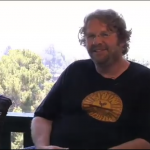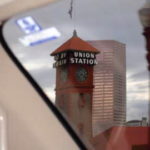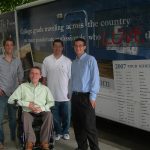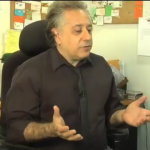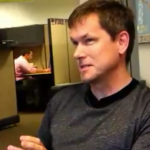Growing up in Wisconsin, Greg watched the Green Bay Packers play as a kid. He, like many other kids, dreamed of playing professional football one day. He played at the college level but there came a point in his career where he had to decide between his NFL aspirations or focusing on finding a career. During college he worked at a couple of hotel restaurants. He enjoyed the experience and realized that there were many opportunities out there. With no other great prospects at his disposal, he decided to go into the hotel business. Greg dropped out of school and moved from Wisconsin to Santa Barbara, CA to work as the night manager and assistant food and beverage director at the Holiday Inn.
 For the next twelve years he would find himself working in twelve different locations across the U.S.. He drove his little Chevy pick-up truck from Santa Barbara to Alaska to manage a small resort in McKinleyville, Alaska. He would later return to the continental United States to areas such as Fairfield, CA, Monterey, CA, Vail, CO, Yellowstone Park, Wyoming and back to Ventura, CA. At 26, he was a general manager for a large oceanside resort there and stayed there for four years before moving to Konocti Harbor. He has been there ever since and for the last 17 years has worked as the President and General Manager.
For the next twelve years he would find himself working in twelve different locations across the U.S.. He drove his little Chevy pick-up truck from Santa Barbara to Alaska to manage a small resort in McKinleyville, Alaska. He would later return to the continental United States to areas such as Fairfield, CA, Monterey, CA, Vail, CO, Yellowstone Park, Wyoming and back to Ventura, CA. At 26, he was a general manager for a large oceanside resort there and stayed there for four years before moving to Konocti Harbor. He has been there ever since and for the last 17 years has worked as the President and General Manager.
When he got to Konocti Harbor it was a motel that looked like it was stuck in the 1960’s. It was beat up, dry-rotted and painted a hideous combination of orange and brown. The carpet was old, only half the rooms had televisions in them and there was a rundown coffee shop/dining room in the lobby. Greg saw potential in the structure as it was situated next to a beautiful lake. Seeking a challenge, he remodeled the motel into a beautiful inn. He added onto the motel, most notably installing an Amphitheater with the lake as a backdrop. This added to the allure of the property as musical acts could now perform in the quaint town.
Greg’s advises that:
“If I would have listened at your age, I would have known a couple of things. One thing is to dare to dream and think that anything is possible. Dream within your profession. Also, probably 75% of your life is at work, so do something you love, and try do something that you have a passion about.”
What is the key to promoting?
“I think the global response to that would be it’s got to be first class. I think you have to have a product and if it’s not there it doesn’t work. If the party you’re promoting is not planned with 100% of your effort, then it won’t work. A party with great entertainment, a great profile, image, and it’s the cool place to be… then it’s going to work. If you’re promoting something, you have to put it together first. Put the event together first and then make it first class. Then promote the event.”
Interview: How To Become an Event Promoter
At the ripe age of 21 I became the night manager at Holiday Inn in Santa Barbara. In the next eleven or twelve years, I was in eleven or twelve different locations as I grew with them in the industry. In our business if you’re really good, they tend to want to move you around. If you’re really bad, they tend to want to fire you. So I was halfway good, so I moved around a lot.
I was in Santa Barbara, I drove the Alcan from Santa Barbara to Alaska in my new Chevy pickup truck. I ran a resort next to McKinleyville, Alaska. I came back down and was in Fairfield, in Monterey, in Vail, Jackson Hole, Yellowstone, Ventura. So I’ve been very fortunate to have gone to good locations and I was the general manager in Alaska at 22 years old.
I came back down and ran a large ocean front resort at 26 for 4 years. I’ve ran this resort for 17 years now. I’m 48. I have lots of years in the business. The eleven years prior, and seventeen years here. I’m one of those that didn’t get a degree, but found a way to make it work.
Realize that in your life, you’re going to work. Probably seventy-five percent of your life is at work. So do something you love. Try to find something you have a passion about.
For me, you have to lead by example and have a passion for what I do.
I’m not just a hotel guy. I would be very bored to do what I did back when I was 22. I’m very fortunate that my passion drives me at a different level. I create the property as you see it, I built probably 75% of it. I built the Amphitheatre. I created the show room. I book the talent. I produce the talent. I write the radio spots. I just got done doing my radio stuff for next Sunday. I’m involved with all that, but without the passion, I don’t think I’m here. So I love what I do.
We have 700 employees. When you micromanage at a large facility, it doesn’t work very well. So with that said, you have to pick and choose where you micromanage and where. It boils down to forming a team like sports. You hear that the greatest teams had great chemistry. The great operations have great chemistry. They have great teamwork and stand back to back. They support your decisions in front of the employees even if they disagree with you behind the scenes. They share your passion for wanting to succeed.
It’s way more than running a hotel to me. It’s developing a way of life. Not only for myself and all my managers and my employees, but being proud of what we accomplished during that time. A property this big requires 70 supervisors and managers and we’ve created opportunities for all 70 of those. So building the team and having the passion to succeed are the two ingredients you need in management at this level.
You’re the President and General Manager at Konocti Harbor Resort.
The key to promoting an event is that it has to be first class. It has to have a first class product. The product has to be there. When you’re promoting something, you put the event together first. You put it together first class. If you’re going to do something, do it right.
So we created Boardstock. Boardstock is a four day insane trip into the world of wakeboarding and wakesurf championships. Hard core skydiving. Motorcross. Extreme street bikes. So you build that first class image, and then that’s really what it is. It’s all the best of the pro wakeboarders and motorcross guys. It’s built around sandy beaches and first class music.
We build the event first, and then you promote the event. The components of a successful event starts with something that’s done right, and then promoting it directly to bring the outcome of a successful financial event.
I think if you talk to most people who are passionate about what they do and are successful at it, they probably have that problem of balancing their personal and professional life. It takes a lot out of you to do what you do. This is not a normal gig. That’s all there is to it.
I’m just a guy who runs a resort, builds concert programs, and does what we do on a very miniscule level. But it takes the same effort and drive and passion to do it. When you do that, you sometimes lose sight of finding time for yourself. So I hit the gym at 4 or 5 in the morning.
That’s one of the biggest challenges for me and the people who do what we do at this level. Because it’s easy to become a workaholic or be overly passionate about what you do. Nothing else matters, and that’s a challenge sometimes.
When I got here, it looked like it was still a motel. It looked like something from the sixties. It was all beat up and brown and dry rotted. Everything that you see that’s painted green now was all orange. The orange and dark brown colors dominated this place when I got here in the 90’s.
There was no show room and a beat up coffee shop. When you checked out the rooms, the mattresses all had sags and the carpet was shagged. Half the rooms didn’t have TV’s and the lampshades had holes in them. It was one of those places where you said, ‘Who would want to stay here? Who would want to work here?’
But then you look at the lake. How many lake front hotel resorts are there that have a lot of potential?
I think the other part is, there’s something about a challenge. I’m not quite sure why, but I did. Seventeen years later I’m glad I did. But those first couple years were a huge challenge. But step by step, we turned it into what it is today.
I used events not only as a way to make money, but as a marketing tool to put our name on the map. Because that’s what shows did for us. Let’s face it. No one know what Konocti was. No one knew what Konocti Harbor Inn was when I got here. Over the years, any place you go and say Konocti Harbor Inn, they’re going to say the place that does concerts.
Boardstock. Without a doubt is the most difficult to plan. It’s the first time we ever shut the property down. This is not an easy property to shut down. On top of that, the parking lot is now a motorcross park. Skydivers, a hundred tons of sand with booths. Bleachers and the water barbeque pits on top. On top of that, huge parking issues. On top of that, there’s a barge on both ends of the property with a Mississippi river boat in the middle of it all. It’s a monster, monster event. There were a lot of charts and theorizing. A lot of permits and working with the county. We did 35,000 people and it was front page on the press democrat. Lots of press and huge response. All that homework that you did paid off because it went very smoothly without hardly a hitch.
By far the most challenging, and by far the most rewarding. Because from day 1 we had people saying we couldn’t do it. But this event was huge. One last thought on that, the local community was worried about the type of guests that would come to that event.
No major problems, no major arrests. They had a great time at a great resort and it was one of the most rewarding things we’ve done because we sat back and said wow. That’s why you do your homework.
Failure really is measured by the bottom line. No ifs and or buts about it. We can plan all we want. If we would have lost money on Boardstock, I don’t care how well it went, it was a failure. In the concert business, it’s a long season. It’s no fun to go work a show and work your behind off and see that you’re losing fifty grand. But you learn to deal with it. If you don’t, you don’t stay in the business. So you learn to put the blinders up, you learn to focus, and you work hard. You put it out of your mind and go promote the next one and try to get that one to do better.
That’s the ultimate challenge for us. It’s winning and losing. You want to have more winners than you do losers. Sports and the same thing in our business. It matters what the average profit line says. The making of a man is not only in good times, but in bad times. Does a guest know that you lost money? No, and they don’t care. They want the same quality and service as if you had made money. Does the artist know? You better not let the artist know that you had to give away 100 tickets to make the venue look good. You treat them just like you made money.
You don’t get too high after the wins and you don’t get too low after the losses. That’s the biggest challenge in the success or failure of an event. You’re going to lose sometimes, and you’re going to win sometimes. Hard work can hopefully overcome most of the losses.
In the early days, it wasn’t very easy to get big name artists to come out here. You had to tell them how to spell Konocti and show them where it was on a map. We still have to do that. But it’s like anything else. Once you’re reputation proceeds you, it makes it easier.
I think we’ve done over 2,000 shows. I’m proud of every one of them because I don’t think we’ve done any less than giving our best.
What means do your measure whether you’re successful or not successful? Well, if you lose money you’re not going to be around to be able to book more shows. It all is built around money. Joe Montana wouldn’t come up here if I didn’t give him $25k and $100 for every one of his four hundred autographs he’s going to sign. Without the money, there’s no Joe.
Doing what I do, you have to be a risk taker. But you have to be a calculated risk taker. In our business a lot of people are snakes. A lot of people can’t be believed and a lot of people don’t make it very long. We don’t have an ego about what we do. With that said, you have to remain a risk taker.
The minute you think you’re good is the minute you’re in trouble. The minute you think you know what you’re doing, for me is the minute that I shouldn’t be doing this anymore. If I think I know what I’m doing, I’m going to go book something and I’ll be too aggressive and book something I shouldn’t be booking and I’ll make a bad decision.
Even all these years later, I analyze everything. I can’t ever get too big for my bridges. It’s not special. It’s just what I happen to do for a living. Because again, when you think you know what you’re doing, that’s when you get the rug pulled out from under you.
I try to use facts and data to make the best calculated decision that I can. Then I use my gut when it’s time to use my gut. I be risky when it’s an opportune time to be a little risky, but overall, I like to make calculated decisions when I can. You have to be a little aggressive to do what I do and be a little wacko, but overall, if you don’t wing it.
You have to take emotion out of your business decisions. The sooner you take emotion out of your business decisions, the better you are. I’ve booked some bands that I liked, and guess what? They didn’t do well. So I try to use facts to book the bands. I look at box office results across the country.
Emotion, whether it’s managing people, disciplinary action, booking talent, even in your private life. The more your decision is based on fact, the better off you are.
I think a first is the most memorable. They say you always remember your first girlfriend. In business, it’s the first time you did stuff. Still, this many years later after deciding I liked the adrenaline pump and the risk and the winning when I did shows, I remember the very first show I ever did. Clear as a bell. I remember the process of setting it up. I remember that feeling that night when we sold both shows out in one night. It was just Dave Mason and it was 300 tickets a show. But I remember sitting out and staring at the water and thinking, ‘Wow. That was fun.’ It’s like an adrenaline pump and a risk. I probably paid him five grand. For a show, that’s a huge risk. So I remember that.
I think all the firsts in the business parts of my life are the most memorable. And I never forget how lucky I am to do what I do. There are a lot of people that could be sitting in this seat and doing a good job. I’m just fortunate that I got the opportunity. And that’s the thing about life. When you get the opportunity, seize it. Don’t back off. Charge it full on because it could turn into something big and huge and special. If you dream big, and if you’ve got passion, when you’ve got that opportunity, don’t look back.
If I had to leave now and go back to running hotels, I don’t think I could. I think I’d go to the promotion side of things and stay doing what is my passion. But either way, I don’t regret one second of all the hard work that went into allowing me to find what my passion was and to be involved in some of the things I’ve been involved in.
I’m very appreciative of the opportunities that have come my way.

